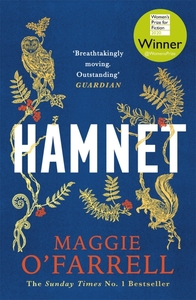You need to sign in or sign up before continuing.
Take a photo of a barcode or cover
dark
emotional
reflective
sad
medium-paced
Plot or Character Driven:
A mix
Strong character development:
Complicated
Loveable characters:
Complicated
Diverse cast of characters:
No
emotional
informative
fast-paced
Plot or Character Driven:
Character
Strong character development:
Yes
Loveable characters:
Complicated
Diverse cast of characters:
No
Flaws of characters a main focus:
Yes
slow-paced
My February Book Club read was Hamnet. A story based on Shakespeare’s son of the same name, and the play Hamlet. Not much is known of Shakespeare’s wife and children and they seem to have been ignored by a lot of history but this book brings them to the forefront. The book is fiction, as we do not know what happened to Hamnet other than his death in 1596 and likewise the full backstory of Agnes (known to us as Anne) and the other children Susanna and Hamnet’s twin sister Judith.
Much is made of Agnes’ ‘abilities’ in this book which gave the story a gothic edge which I enjoyed. It makes Agnes seem very mysterious and earthly and uncovers multiple layers to her personality giving her, her own voice rather than just being seen as Shakespeare’s wife. Likewise, the relationship between the playwright and his family is examined. This brings him to life making him seem much more real and personable, rather than the elusive figurehead of the stage we have been taught to see him as.
The fictional story ties in with historical facts (plague) and Shakespeare’s rise to fame and fortune. This is a superbly well written book with great depth, rich characters and a pace that keeps you page turning till the end. It has clearly been a labour of love for Maggie O’ Farrell and shows in every page.
emotional
sad
medium-paced
Plot or Character Driven:
Plot
Strong character development:
No
Loveable characters:
Yes
Flaws of characters a main focus:
No
challenging
dark
emotional
informative
inspiring
reflective
sad
tense
medium-paced
Plot or Character Driven:
A mix
Strong character development:
Yes
Loveable characters:
Yes
Diverse cast of characters:
N/A
Flaws of characters a main focus:
Yes
emotional
sad
medium-paced
Plot or Character Driven:
Character
Strong character development:
Yes
Loveable characters:
Yes
Diverse cast of characters:
No
Flaws of characters a main focus:
No
Yet another book I found too difficult to finish, not because it was bad but because it was too real, too raw, too familiar.




